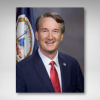| One issue that is not getting enough attention in this election, especially for its impact on Virginia, is the growing “anti-trade” mentality of both major parties. In Tuesday’s debate, former President Donald Trump stated, “other countries are going to finally, after 75 years, pay us back for all that we’ve done for the world, and the tariff will be substantial…” Vice President Kamala Harris accurately responded that increased tariffs aren’t paid by foreign countries, but are really a sales tax on US consumers. It is important to note, however, that Harris and the Biden administration have kept all of the increased tariffs from the first Trump administration in place. In May, they even raised tariffs on $18 billion of Chinese goods, including semiconductors and electric vehicles. The left remains committed to tariffs (sadly, often as a tool to force their green agenda) and the right is drifting against trade out of a misplaced “America First” mentality. Even the Heritage Foundation, once a champion of free trade, in its much mischaracterized Project 2025 manifesto is waffling on free trade. In fact, Project 2025 contains two contradictory chapters — one by Peter Navarro entitled, “The Case for Fair Trade” and one by Kent Lassman entitled, “the Case for Free Trade.” It is clear that Heritage’s new trade philosophy increasingly emphasizes the need for “reciprocity and fairness” in trade agreements over open markets and increased trade. This shift is not just bad for America generally, but is particularly bad for Virginia. International trade continues to play a vital role in Virginia’s economy, driving growth, supporting jobs, and enhancing competitiveness. According to the U.S. Global Leadership Coalition, in 2023, Virginia exported $22.4 billion worth of goods, with key markets including Canada, China, and India. The agricultural sector alone contributed $1.5 billion in exports, underscoring its importance to the state. Additionally, over 7,000 Virginia-based companies are engaged in exporting, 85% of which are small- and medium-sized enterprises. Trade accounts for roughly one in five jobs in the Commonwealth. These jobs span various industries, from manufacturing and agriculture to defense and technology. The state’s robust international engagement is further amplified by initiatives like the Virginia Economic Development Partnership’s VALET program, which has helped hundreds of businesses expand globally, contributing significantly to job creation and revenue growth. Furthermore, improvements at The Port of Virginia, now one of the most advanced on the East Coast, have tripled its economic impact over the last two decades, reaching $92 billion in annual output. This has reinforced Virginia’s role as a critical hub for international trade. David White, Executive Director of the Virginia Maritime Association, is right when he argues that Virginia’s top spot on CNBC’s ranking of Top States for Doing Business is due in large part because of our robust shipping and maritime industries. Rather than turning away from free trade, what Virginia needs now is a return to former President Ronald Reagan’s unwavering belief in free trade. Reagan rightly believed that trade was not just to expand America’s economic pie (which it has done remarkably over the last 30 years), but also to build wealth in our allies. It was viewed as an extension of individual liberty worldwide and a means of promoting peace and understanding between nations. In his view, when countries engage in mutually beneficial trade, they are less likely to resort to conflict. During his Presidency, Reagan initiated the Uruguay Round of multilateral trade negotiations, which culminated in the creation of the World Trade Organization (WTO), a global institution designed to oversee and regulate international trade. Reagan also signed the U.S.-Canada Free Trade Agreement, a precursor to the North American Free Trade Agreement (NAFTA) now called the US-Mexico-Canada Agreement (USMCA), which aimed to eliminate trade barriers between the United States, Canada, and Mexico. Yes, Reagan sometimes overlooked inequalities in trade deals, but it was out of a hope of building wealth and peace and as a counter to the expansion of the then threatening eastern bloc. His policies worked. Today, Russia is again on the move and China is rattling its sword towards Taiwan. We need friends and allies today, almost as much as we did back then! Free trade is an essential part of making those friendships a reality. It also is critical for our sustained economic leadership. In Virginia, as in the rest of the country, trade allows for greater wealth and economic security. Leaders in both parties from Virginia need to press their respective leadership to keep America, and Virginia, open for business. This should be a bipartisan priority for the sake of Virginia’s economy. |
| Derrick Max is the President and CEO of the Thomas Jefferson Institute for Public Policy. He can be reached at DMax@thomasjeffersoninst.org. |

Derrick Max is the President and CEO of the Thomas Jefferson Institute for Public Policy. He can be reached at DMax@thomasjeffersoninst.org.






